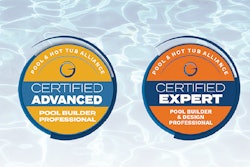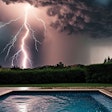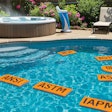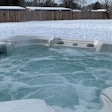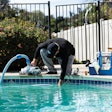
"When you start out," he says, "you're only learning the business through what other people tell you, and whatever you can figure out yourself through trial and error."
In addition to the limitations of ignorance, the lack of official certification hampered his career and earning potential, because at his company, promotion and salaries were in part tied to formal training.
After advancing through the APSP's Tech 1 and Tech 2 training levels and then receiving the Certified Service Professional credential, his situation has changed rather dramatically.
First of all, at 24 years of age, he's now service manager at Underwater Pool Masters, West Boylston, Mass., making a salary that would be the envy of most college graduates his age. But more importantly, his technical ability and understanding is on course to reach the level of craftsmanship that makes jobs efficient and easier.
A deeper understanding of water chemistry and pool equipment has paid dividends on a day-to-day basis, he says. "You'll get to a job and you will have seen it in the classes and learned little tricks that help you do it faster. And you know what to expect before you get to the job. That helps because you can plan ahead and take the right parts, and you're more likely to get the job done in one trip."
O'Brien has noticed that the formal recognition that accompanies certification affects the way he is perceived among his peers and on the job. "People just feel more comfortable with me working on their property knowing that I'm a Certified Service Professional," he says.
In some ways, it's an induction into the modern-day guild of pool professionals - a chance to gather the wisdom of both peers and pool pros with decades of experience.
One thing that's really helped O'Brien, he says, is the chance to talk to all different kinds of pool guys, and learn their tricks - the other people in the course, and the instructors. "Because being a pool guy, you don't see that many of us around. I mean, you don't stop into Dunkin' Donuts, sit down and start talking to another pool guy. You are usually just talking to the guys in your own business, and they know the same things you already know. But when you get a bunch of pool guys from different places all in the same room, you can learn quite a bit."
Chemical Hazards
It's more than just a matter of inefficiencies on the job, lack of training can pose a danger to bathers and service techs alike, for the simple reason that pools offer a number of hazards - waterborne illness, drowning through entrapment or equipment failure, and pool chemical poisoning just to name a few. Proper understanding of them is critical.
"Worst case scenario? You could get hurt or killed," says CPO instructor Brent Brockmeyer, Vaughan Pools, Jefferson City, Mo.
As an example, Brockmeyer points to trichlor, a mainstream sanitizer, and calcium hypochlorite, a commonly used shock. Both are typical residents of a pool equipment room, but both can be quite dangerous.
"Calcium hypochlorite is a class 3 oxidizer," he says, "so it's incompatible with anything organic, and that includes all of your clarifiers and all of your algaecides. If you were to store any of those types of liquids above calcium hypochlorite and a lid is loose or off, and let's say its during the winter and the algaecide freezes and develops a crack and leaks into the calcium hypochlorite, somebody's going to come back and notice that the storage room or pumphouse is gone.
"Their first thought will be that it was arson, but it won't take the fire marshall long to figure out what happened. This is just an example of why class work is important, because that's where you learn about hazards around the pool."
It's not just the service tech's own health that's at stake. The health of everyone that uses the pool is also affected by a tech's understanding and professionalism, says Roy Carter, director of inspector education, Champions Inspector School, Houston.
The role that pools and spas play in the spread of waterborne illnesses such as Crypto to Legionnaires' disease is well understood, he says, but "I've found that a lot of people without formal training don't translate the recreational water illnesses into something that they're responsible for, and they tend to find themselves treating pool symptoms but not really addressing the problem.
"The benefit of the classes is that once people truly understand how dangerous recreational water illnesses are and how they're caused, they take it more seriously, and say to themselves, 'I really better make sure I get the right amount of treatment for this pool.'
"Training awakens that mind-set. And that's really important, because they hold the swimmer's health in their hands."
State Requirements
While some of these considerations offer persuasion for service class enrollment, some states are simply demanding it. At the forefront of this effort is Connecticut, which has one of the strictest systems of service education in the country. In that state, a license is required to work on any pool, public or private.
"The only thing it does not cover is basic weekly maintenance. If you're just going out there to vacuum the pool, you don't need it," says Lawrence Caniglia, executive director, Northeast Spa & Pool Association (NESPA). Otherwise the law stipulates that pool work be supervised by someone with an SP (Special Plumber) license.
To get the license, 288 hours of classroom education are required along with 2,000 hours of field work (about two years) to get the minimum (SP2) license, which is the first license in the two-tiered system. Further training is required to obtain the highest level (SP1), Caniglia says.
"The classroom requirement is roughly equal to having taken Tech 1 and Tech 2 in the APSP scheme, then you need 2,000 hours in the field, and then you have to pass a test. Typically what you see is techs who have had three or four years in the field going after their license. By then they've got more than enough hours of education and field experience."
And that's just the beginning. "We're in the middle now of backing the effort to expand that law even further to cover builders, as well. If that passes you would need a license to both build and service pools. Right now it's just servicing."
These ongoing efforts are part of a national trend toward more formal training for the people who take care of both public and private pools. National legislation such as the Virginia Graeme Baker Act have focused attention on the issue of pool safety and the role in it service techs play.
That's one reason O'Brien went after his certification immediately. "In this industry, soon you're going to need to be certified to do any work. That's the way it's headed. They don't want just anyone out there to work on pools, because that's led to a lot of problems in the past.
"Now's the time to get into the game. If you can be certified now, you'll be all set once licensing and certifications become a requirement. It's just a matter of time."
As it stands, there is a wide variance in state requirements. Some states, such as Missouri, require no training of any sort in order to work on pools. Others only have requirements for dealing with public pools.
According to Steve White, owner of Underwater Pool Masters and educational director for APSP's Region IX, there are 20 states that require a CPO certificate to work on a public pool, a number he sees growing in the coming years. But White points to the larger stakes in the drive toward a formally educated pool and spa service sector.
It's no secret that fly-by-night operators and unprofessionalism have plagued the pool and spa industry from the very beginning. Like many others in the industry, White feels that the status of service personnel and builders has suffered because of it, making the work less profitable. He believes that a formal certification and licensing process will help solve the problem.
"Every service person on the road," he says, "whether it's an HVAC guy, a plumber or an electrician, puts their credentials where everybody can see them. It tells me that they are professionals."
White says that similar, rigorous certification and licensing procedures will eventually result in better pay for workers and builders alike.
"You've got to make this industry a professional one."
The Early Days Of Education
A short narrative from Al Rizzo, 50 years in the industry and the first ever recipient of the APSP Certified Building Professional of The Year award
I built my first pool in 1955. By the time I got to the mid to late '60s I noticed that these things fell apart after a while. Pumps went, heaters went, and somebody had to fix them. I didn't want to give that up to anybody else. So I started training personnel.
My ambition was to put together a program to train people to take care of pools. I called the local employment agency and said, "I need guys who are between 25 and 35, mechanically inclined and out of a job. I want to teach them to fix pools." And they would send a group down and I'd pick out 20 to 25 guys per class.
In the early '70s we put the program together. The first topic we covered in our training, and it's still in the book today in the Tech 1 service manual, is the philosophy of the service person. How that person should treat the homeowner, his employer and himself.
And what he can expect. Because at that time, it was considered a summer or part-time job with little esteem. Just a kid's job. There was this idea of a pool guy with his shirt off in the backyard cleaning a pool, and somebody from the house would be likely to grab him and start making love. But we felt it should be more professional and have more status.
The book we used for training had about eight chapters and about 150 pages. That was the beginning of the modern Tech 1 and Tech 2 manuals. It's up to, what, several hundred pages now?
But in those first training programs, we rented an old factory that was being converted. It was a huge building, the place had 40- to 50-foot ceilings, and I set up five spas in there with heaters, filters and pumps, and said, "These spas are miniature pools."
And that's what we worked on. There was no water in the building so we had to run a garden hose from next door to fill the spas. Or even to use the toilet. We'd fill the tank from a garden hose in order to flush the toilet.
As rough as it was, it was the great place to go to really learn how to fix a pump or a heater.
- Al Rizzo | Owner, Rizzo Pools



























